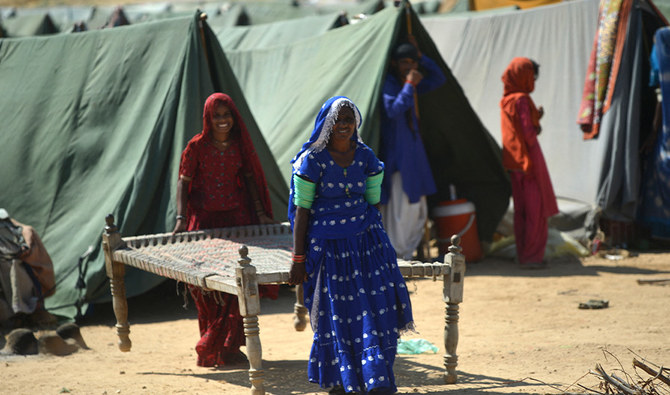DADU, Sindh: Inside a small tent on a major highway in Pakistan’s southern Sindh province, Shabiraan Ameer held up her arms and moved her face to a side to bare her neck, both covered in rashes and stained with blood from constant scratching.
Ameer’s family is only one among nearly 15 million people affected by recent floods in Sindh and living in tent-cities and makeshift shelters on roadsides or staying back in flooded villages, surrounded from all sides with water.
As waters from the floods recede, which officials say may take up to six months, swaths of Pakistan, particularly the Balochistan and Sindh provinces, have become infested with diseases including malaria, dengue fever, diarrhea and skin infections.
According to a Sindh health department report, nearly 350 people have died since July 1 of diseases that have spread in the aftermath of floods. Doctors have treated 3.38 million patients with diarrhea and skin diseases, acute respiratory infection (ARI), and suspected and confirmed cases of malaria, dengue and other conditions at 21,955 medical camps in Sindh.
“It [skin] bleeds when I rub it,” Ameer, a young mother of two, told Arab News. “I clean the wound with a cloth, then I sit and cry.”
In Dadu district where Ameer is from, Pakistan’s largest freshwater lake of Manchar burst its banks, submerging hundreds of villages and displacing nearly 0.8 million people.
As the water level rose three weeks ago, Ameer and her entire family were forced to tread to safety through toxic waters.
“We don’t have a home and if we had money, we would have treated this,” Ameer said of her infection. “My entire body is taken over by disease.”
Pointing to her children, she added: “My small children shout and cry in pain. Their bodies also bleed, they weep.”
Many patients interviewed by Arab News at government medical camps for flood survivors in Dadu said they were not attended by doctors or given proper medication.
“I got my check-up, but fever doesn’t go away,” Ibrahim, a child whose mouth had rashes due to high-fever, told Arab News.
Rukhsana, who only gave her first name, said her three-year-old son had been ill for over a month:
“I got him treated at a government hospital, we have given him a lot of medicines but his fever doesn’t go away.”
Doctors and organizers at the tent city admitted they did not have adequate resources to deal with the scale of the problem, especially when there was one doctor available per 500 patients.
Flight Lt. (R) Musarrat Shah, a social activist who is running a tent-city in Kakkar, said women and children were particularly vulnerable.
“We are unable to provide good treatment and good medicines to this large scale of people,” she said. “A single doctor for 500 … is not enough when people are facing so many diseases, so many problems.”
Dr. Muhammad Ali Chandio, a government doctor in Dadu’s main city camp, said fever and skin disease were rampant at the facility and malaria was suspected in a growing number of people.
“The water available here is not clean, which is causing abdominal diseases in people, there are cases of diarrhea, cholera,” the doctor said. “If the environment is not good, then it’s obvious that diseases will spread.”
At the IDP camp in Dadu city, Dr. Saima Parveen, the doctor in charge, said medicines needed proper storage and an enabling environment to work.
“Fever will subside if you give syrup, paracetamol to kids with high fever but this environment, and this weather, the hot weather, will not let the fever go away,” she said.
“They [doctors] gave anti-malarial to children but due to the atmosphere here, the dirty water standing here, the mosquitoes will come, mosquitoes bite them and they get malaria again.”
Chandio added: “A temperature of 25 Celsius is required to keep medicines but here it is very hot and the medicines get spoiled and they are no longer effective.”












